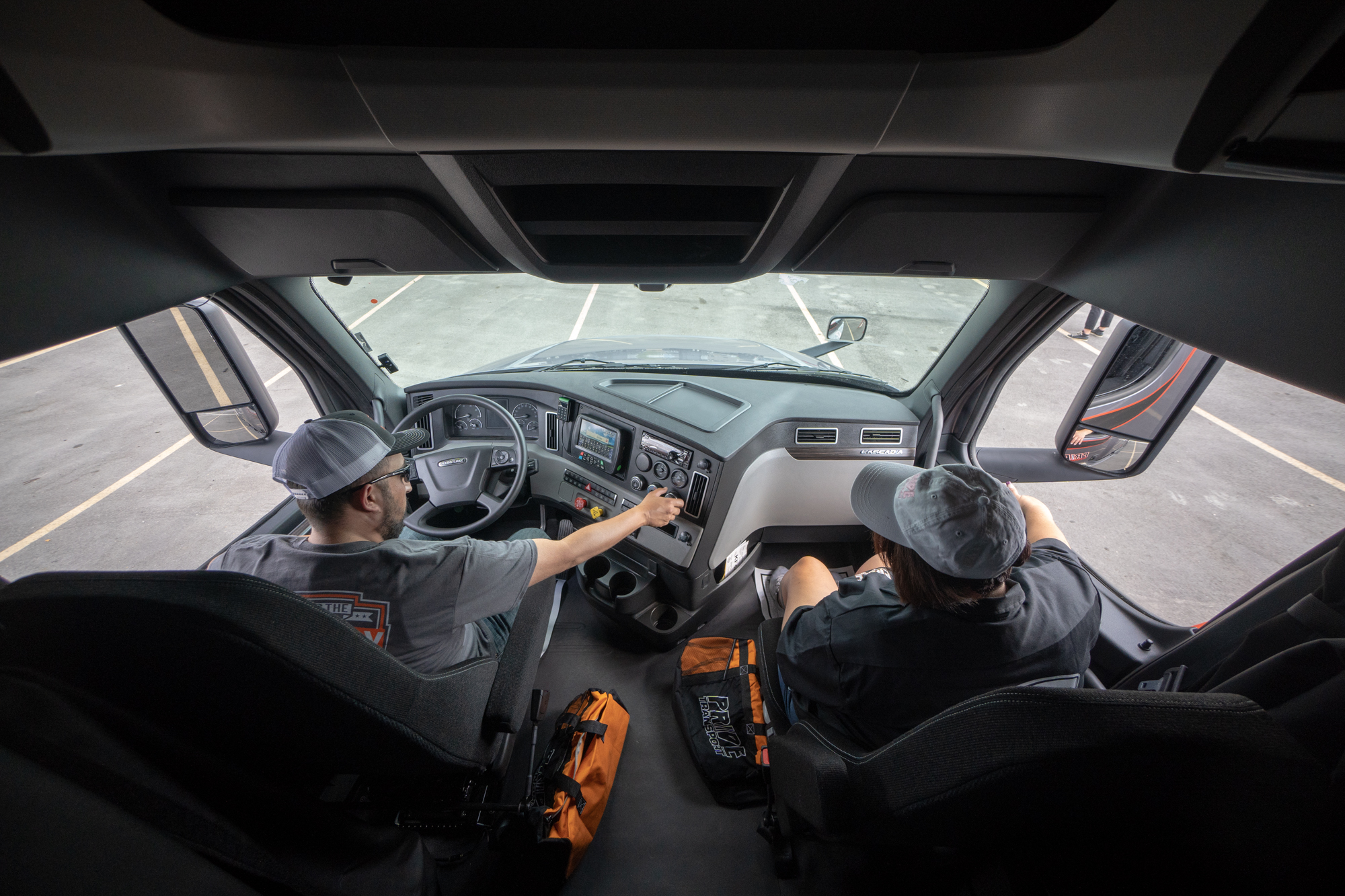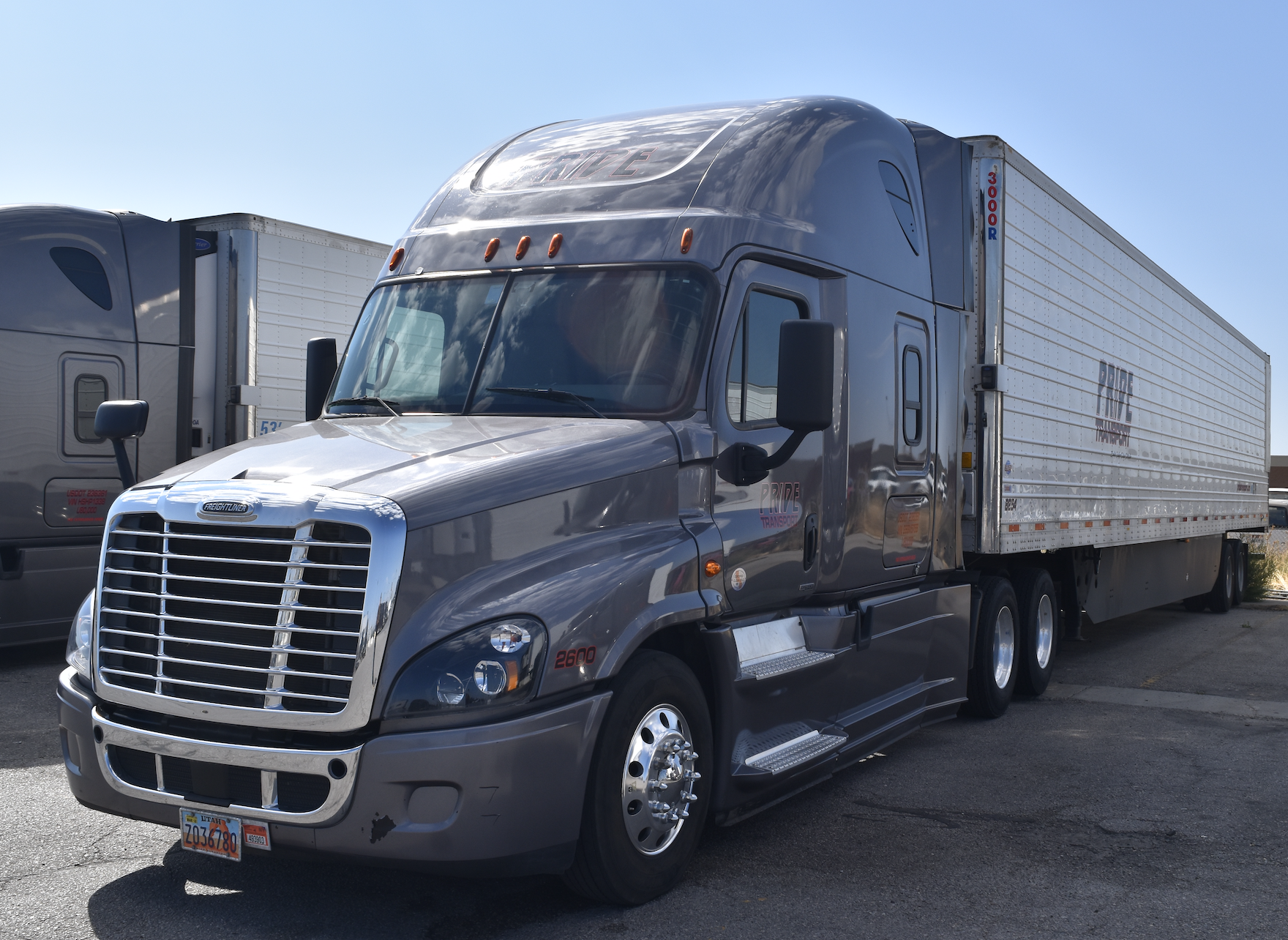by Pride Transport | Sep 05, 2023
Few career paths are as unique as truck driving. While being a safe and smart driver is essential, the profession also requires physical and mental strength, logistical expertise, good communication, and excellent time management skills. Not just anyone can make truck driving a career!
Even with all there is to learn, driving commercial trucks doesn’t have to be overwhelming. New drivers can hit the road with confidence with the right knowledge, preparation, and these essential tips.
Certifications, Licensure, and Education
There are a few essential steps new drivers need to take before racking up miles on a big rig.
Licenses and driving school
Many other professions require some type of certification or licensure, and trucking is no different. Before you become a truck driver, you must obtain a commercial driver’s license (CDL) before legally operating most types of commercial vehicles. Drivers are also required to complete training through a reputable truck driving school. At Pride Transport, we offer training courses for both experienced and new drivers to make sure our drivers get the instruction they need to be successful (and safe!) in their driving careers.
Compliance
Passing truck driving school and getting a CDL are just the start of being a qualified truck driver. Drivers must also comply with laws and regulations at the national, state, and local levels. Compliance in the trucking industry includes staying up-to-date with governance from many organizations, including:
- Federal Motor Carrier Safety Administration (FMCSA)
- Department of Transportation (DOT) at both federal and state level
- Occupational Safety and Health Administration (OSHA)
- National Highway Traffic Safety Administration (NHTSA)
Compliance goes beyond following traffic laws and includes guidance on driving hour limits, recording hours, vehicle maintenance, and more.
Physical fitness
There’s no denying that driving a truck means a lot of hours spent sitting; however, that doesn’t mean physical fitness can fall by the wayside. Drivers who are physically fit have better stamina and energy to meet the demands of the job.
When your truck is parked for the day, take time to stretch your legs and get moving. Walking, running, and even quick calisthenic workouts all get your blood pumping and help to keep you fit. Check out YouTube for workout ideas—try searching for strength training, high-intensity interval training, or yoga videos to mix things up.
Developing Skills and Firsthand Experience
Even with rigorous training, no amount of preparation compares to the knowledge and skills gained with real-world experience. New drivers need to communicate with schedulers, dispatchers, maintenance teams, clients, and other drivers to gain insights they can refer to when making their own decisions on the road.
Ultimately, though, there’s only one person behind the wheel at a time—that’s you—which is why it’s important to keep your own driving skills sharp as well. Many industry professionals refer to the Smith System for safe driving (including us at Pride Transport). Additionally, take time to practice appropriate defensive driving and maneuvering techniques when you’re not actively making deliveries.
Knowing how to operate your vehicle in different types of weather is important, too. Sun, wind, rain, and snow all have different effects on the road, so you should expect your approach to driving to vary, too. Regardless of the weather, being prepared with a safety essentials kit can help to ease your mind when unpredictable weather pops up.
Striking a Balance Between Home and Road Life
One of the biggest adjustments new truck drivers experience is spending a significant amount of time on the road. Over-the-road (OTR) drivers can be away from family and friends for weeks at a time as they transport goods across the country. With so much solo time, it’s important for new drivers to plan how they’ll stay connected with loved ones and decompress after a long day of driving.
Keeping a journal can help drivers work through their thoughts and feelings in their new career. (Plus, keeping a daily record of new experiences can offer a fun way to reflect on a driver’s first year behind the wheel.) Scheduling regular calls with family, sending texts and emails with friends, and even sending postcards to loved ones are great ways to share your day and first-time experiences with those you care about most.
Cross-country hauls require stamina, so it’s important to think about how you’ll build healthy habits into your lifestyle. Start by stocking your cab’s cooler or mini fridge with healthy meals and snacks. Hard-boiled eggs, low-sodium jerky, and hummus and veggies are simple, high-protein options that can be easily packed and stored. If you end up swinging through a fast-food restaurant, look for grilled chicken options or salads with protein.
Work wellbeing matters, too, and one way that drivers can take care of their mental health is by staying organized. Maintaining a file or folder with all of your necessary documents ensures that you’re always prepared with the right information and helps to ensure compliance. Before every trip, make sure you have the following:
- Insurance information
- Truck and trailer registration
- CDL
- Logbook showing hours of service (in case the electronic logging device malfunctions)
- Medical forms
- Delivery documentation
Making Safety Your Number One Priority
Safety starts before your route even begins. You need to understand the ins and outs of your truck and trailer, so consult with your company’s maintenance department to make sure you know exactly how to operate the vehicle. Conduct a pre-trip inspection prior to every trip so your truck is ready for service.
Your goal should be to drive accident-free, especially during your first year, so consider adopting this mantra: There’s no such thing as being too safe. The following situations are some of the biggest safety obstacles new drivers encounter:
- Get out of the cab (after parking in a safe area) and check your backing path before backing into a delivery dock. Delivery zones don’t always have the same dimensions; take your time to form a plan that ensures safe maneuvering.
- Adjust your speed and following distance depending on current weather conditions. Trucks take longer to brake when road conditions are wet, slippery, or icy, so increase your following distance and plan on slowing down much sooner than you typically would in normal weather.
- Long hours on the road contribute to driver fatigue, so have a plan in place when sleepiness sets in. Aim to go to bed and wake up at the same times every day, avoid sugary and caffeinated beverages in the afternoon and evening (they can disrupt your sleep later on), and create a relaxing sleeping environment using supportive pillows and comfortable bedding.
Finding Support and Guidance in the Industry
Being a solo driver doesn’t mean you have to learn in isolation. The trucking industry is full of supportive, knowledgeable people who have a lot of guidance and encouragement to offer new drivers.
Start by learning from drivers and other team members in your company. Experienced drivers can offer advice on specific routes, handling tricky situations, and adjusting to the truck-driving lifestyle. Company dispatchers are another great resource for new drivers, as you’ll work closely with dispatchers to determine delivery loads and routes.
New drivers can also benefit from joining industry associations and online communities dedicated to the trucking profession. Facebook, LinkedIn, Twitter, and Reddit are all places you can find and connect with fellow drivers to learn more about shipping and transportation.
Having a mentor or a group you can trust is extremely valuable in what can sometimes be a challenging job. At Pride Transport, we offer guidance, training, and benefits to all of our drivers so that their career can be a rewarding experience. If you’re interested in being a part of the team, check out our careers page.
